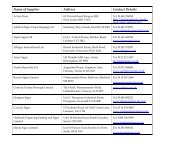titlepage/contents pg 1-16 - British Parking Association
titlepage/contents pg 1-16 - British Parking Association
titlepage/contents pg 1-16 - British Parking Association
You also want an ePaper? Increase the reach of your titles
YUMPU automatically turns print PDFs into web optimized ePapers that Google loves.
58 Chapter 5transport and parking policies.<strong>Parking</strong> provides access togoods and services and thusfacilitates economic activity. Theprovision of ample parking spaceis seen by many local authoritiesas a key factor in economicdevelopment. This view may besimply a response to developers’requests, or public perception,based on traditional rather thancurrent planning policy. Therewill need to be a change ofapproach whereby good accessrather than simply good caraccess becomes the main issue.The Government, in PPG6, (nowPPS6) argues in favour of goodqualitytown centre car parking tohelp retail developments tocompete with out-of-town stores.Out-of-town centres areattractive to car borne shoppersand can provide a wide range ofgoods with cheap or freeparking. However, town centresneed to maintain theircompetitiveness by providing adifferent kind of experience,based upon a wide range ofcomparison goods and a highquality environment.Moreover, the relationshipsbetween amenity, activities andaccessibility (including roads,parking and other modes) arecomplex, and the view, widelyheld, that more parking isnecessary for the viability andvitality of town centres is basedupon an assumption rather thana fact. Indeed the way in whichparking supply is managed islikely to impact on the way thelocal economy is perceived.Ideally towns should worktogether when determiningparking supply and price, sinceproviding parking incentivesunilaterally may causeunreasonable competition anddraw in customers fromneighbouring catchments, thusincreasing the overall length ofshopping journeys by car.Equally, there is no point indeterring car users from using aparticular centre if this leads toexcessive travel to competingcentres. The Regional TransportStrategy should be an importantmechanism for coordinatingparking strategies of competingcentres.As well as the implications foreconomic policy objectives,parking itself is an economicactivity. Local authorities receiveincome from operating publiclyprovided parking facilities, andfrom fines for infringements ofparking regulations. In recentyears there has been increasingpressure from centralgovernment for a local authority’sparking operation to be selffinancing.The arrangements forthe transfer of the enforcementfunction to local authorities,introduced under the 1991 RoadTraffic Act, state that theoperation must become selffinancing as soon as possible.These issues are dealt with morefully in Chapters 7 and 8.Relevant objectives, therefore,might include:● To provide parking to supportthe local economy;● To manage parking toencourage short stay visits inthe town centre;●To integrate the charges forparking with objectives forother modes of travel;● To charge for parking toensure a reasonable balancebetween the demand andsupply for parking at alltimes; and● To ensure that parkingrevenues cover parkingcosts.Again appropriate policies arecovered in Chapter 6, butsuitable targets might be:●●●Peak demand not to exceed85% of supply at all parkinglocations;A declared level of parkingspace in the town centre thatemphasises short stayparking; andX% of on-street car parkingspace in the town centre(defined) to be converted toalternative uses within adesignated period.







